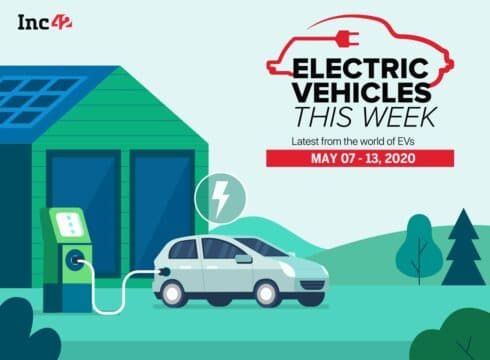Electric mobility players are looking at strategic ways to promote the adoption of EVs
Bounce, Yulu, eBikeGo and Euler Motors are offering EVs on a monthly subscription and rental basis for companies
Okinawa resumes operations with 25% workforce across departments
Inc42 Daily Brief
Stay Ahead With Daily News & Analysis on India’s Tech & Startup Economy
Electric Vehicles This Week
Inc42 brings the weekly briefing on India's budding electric vehicle industry. Get a rundown of the latest news, innovations, new launches, research & insights on the electric vehicles industry and the global learnings.
As auto players fight the pandemic and lockdown, many factories are expected to shut their production units due to crunch in manpower, sales and raw materials. But with the pressure to go electric gradually gaining popularity, many electric mobility players are now looking at strategic ways to promote the adoption of electric vehicles.
With the relaxation of lockdown in some areas, both government and private companies have allowed its employees to work from offices at 33% capacity. However, with the scarcity of public transport, the majority of them are looking at viable and safer options for their employees to commute.
Many electric mobility players like Bounce, Yulu, eBikeGo and Euler Motors have come forward to offer their electric vehicles on a monthly subscription basis to delivery companies like Zomato, Big Basket, Delhivery, Rebel Foods, Goodbox and Swiggy among others. For instance, eBikeGo said that it offers affordable monthly subscription services of electric scooters starting from INR 3.6K per month for companies and individuals.
Bounce founder and CEO Vivekananda Hallekere had also said in his Twitter post that companies that are into essentials deliveries can hire people without scooters, where his company will offer them vehicles. He added that Bounce has 1,000 electric scooters in Bengaluru and 20K plus petrol scooters across eight cities.
Many industry experts believe that post-lockdown more people will prefer to opt for electric vehicles which will provide safety and help to maintain the pollution-free environment created during the lockdown period.
Chart Of The Week:
EV News Of The Week
Okinawa Resumes Operations With 25% Workforce
Gurugram-based electric vehicle manufacturer Okinawa recently announced that it has resumed operations with 25% workforce at its corporate office, manufacturing unit and dealership networks. The company said that all its products will be sanitised before getting dispatched from their manufacturing outlets and dealers. It has also installed a sanitisation tunnel for individuals working at the plant
It added that all the dealerships reopening in orange and green zones will be disinfected on a daily basis, along with mandating the download of Aarogya Setu mobile application, masks and other protective equipment. Jeetender Sharma, Okinawa’s managing director said that the company has issued an advisory to dealer partners and a comprehensive standard operating procedure to their workforce, in order to ensure complete safety.
Hero Cycles Bets High On Bicycles, Electric Vehicles
In the aftermath of Covid-19, bicycle major Hero Cycles recently said that to promote social distancing, bicycles could be a potential alternative mode for people who used the crowded public transport system. Pankaj Munjal, chairman and managing director of Hero Cycles, in a media report, said that there will be growth in cycle sales even in rural areas.
He added that the company would be revamping its production soon while focusing on export-led growth. “We will also be focusing on electric vehicles and auto component sectors to make a quick revival,” he said. Currently, the company has a 5% market share globally, which it plans to double by 2023.
EV Headlines From Around The World
The World Needs 1000 GWh Of Battery Manufacturing Capacity To Fuel Clean Mobility, Says IEA
Paris-based International Energy Agency (IEA) said that the world needs battery manufacturing capacity of 1K Gigawatt hour (GWh) per year by 2025 to meet the global target for electric vehicle transition amid the pandemic. It said that the capacity to make battery cells has expanded tremendously in recent years. Globally, manufacturing operations can produce around 320 GWh of batteries per year for use in electric vehicles, it added.
Further, the energy agency said that for clean energy transitions the shift towards producing batteries and hydrogen-producing electrolysers are the two important technologies. It also highlighted the drop in the cost of lithium-ion batteries across countries. IEA also lauded the government’s initiatives and policies to promote the adoption of electric vehicles and the requirement of integration of renewable energy sources such as wind and solar photovoltaic for electricity generation.
Stanford Researchers Reveal New Method To Recharge EV Batteries
A group of researchers from Stanford recently claimed that it has developed a technique which uses magnetism to recharge batteries for electric vehicles as they operate along roads and highways. Using this technology, robots and drones can also be recharged as they operate. A media report quoting the team said that their method, however, will need to be scaled up before it is able to be applied to moving vehicles.
{{#name}}{{name}}{{/name}}{{^name}}-{{/name}}
{{#description}}{{description}}...{{/description}}{{^description}}-{{/description}}
Note: We at Inc42 take our ethics very seriously. More information about it can be found here.


